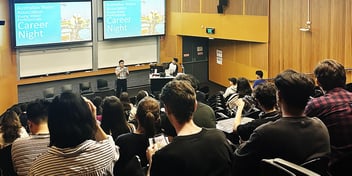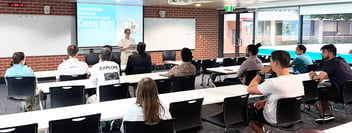For young water professionals, leadership training proves critical to professional development
The water sector faces unique challenges, and therefore water professionals need to develop their own unique set of skills to address them.
Strong leadership is a crucial component to steering the industry through an uncertain future, and some young water professionals are taking the next steps in their professional development through the Online Team Leadership Course.
The leadership training course, a collaboration between the Australian Water Association and the International WaterCentre, is a chance for water professionals to learn the fundamentals of leadership and enhance their professional development.
Angelique Van Walle, a graduate engineer at Unitywater, said the course was a great opportunity to develop her skills and gain some leadership experience.
“I’m fairly new to the industry, so it was great to see what makes an effective leader,” she said.
Lalji Rathod, an operations engineer with Kempsey Shire Council, said he enrolled in the course to boost his professional development and prepare for the next stage in his career.
“I’m currently in my first leadership role, and I wanted to get it as right as I can from the beginning,” he said.
“I see myself growing into a supervisory role, and I wanted learn how to manage and engage people, and improve my overall leadership skills.”
Another participant, water engineer Claire Horsley, said the course appealed to her because of its focus on water industry professionals and the unique challenges they might face from a leadership perspective.
“In particular this course was attractive because of its targeted nature towards the water sector and water professionals; it had very specific aspects that appealed to me and looked different than just your average leadership course,” she said.
“You’re interacting with others in your field, and sharing relevant knowledge and experiences. There were also some course materials that were specific to the water industry, which were full of practical advice rather than generic information.”
Participants took part in a series of modules covering the fundamentals of leadership in the water industry, self-leadership and team leadership, and how to lead cross-boundary and virtual teams.
“We were encouraged to develop a leadership plan to help us continue to develop as leaders into the future,” Van Walle said.
“With that leadership plan, I was able to map out my strengths and weaknesses as a leader. It was helpful to see the skills and qualities I was lacking, and the template is a useful guide to continuously develop myself.”
The material was presented in diverse and interesting ways, Horsley said, and the interactive element was a great complement to the assignments and written materials.
“There was quite a range of professionals in the course – some new, some more experienced – as well as diversity in the areas people worked in, from government to water services, consultants and the private sector,” she said.
“Everyone had something to share and brought something unique to the table.”
Lessons were spaced out over several weeks, and included personalised feedback from course facilitator Dr Andre Taylor from the International WaterCentre.
“Feedback from Andre was brilliant; he pointed to a few things for me to improve on and resources to turn to – I thoroughly enjoyed it and the level of detail was superb,” Rathod said.
Van Walle agreed: “He helped to facilitate discussions online, and lots of people were getting into it, asking questions and contributing. He was really great at giving feedback and sending us links to important resources on the topic [of leadership].”
Since taking the course, participants said they have plans to apply the lessons to their future professional development.
“I have my leadership development plan now, and I’m trying to find a workplace mentor as well to get some advice and feedback from them to improve my performance and leadership skills,” Rathod said.
The difference between a manager and a leader was further cemented for participants – a lesson they plan on applying in their own workplaces going forward.
“Something I hadn’t applied a lot of thought to before was the difference between leadership and management, and what it means to give people the confidence to be leaders who aren’t necessarily in managerial roles,” Horsley said.
“This course helped me put the two of these together. You don’t need to have the authority or superiority to be a leader. Anyone can be a leader in their area.”
“Being an engineer, I’m more process oriented but leadership takes a broader vision,” Rathod said.
“That changed my perspective on the role and gave me more insight into whether a manager can be a good leader and how to get to that point.”
The leadership lessons provide a toolkit for practitioners to reference as they progress through their career, said Van Walle.
“It gives you a better understanding of the difference between a leader and a manager, and it opened my eyes to how involved it is to be a good leader – I feel like I’ve become more aware in the workplace,” she said.
Are you a water professional who is keen to take their leadership and management skills to the next level? Registrations are now open for the 2017 intake of the Online Leadership Training Course. To learn more and to register, click here.


